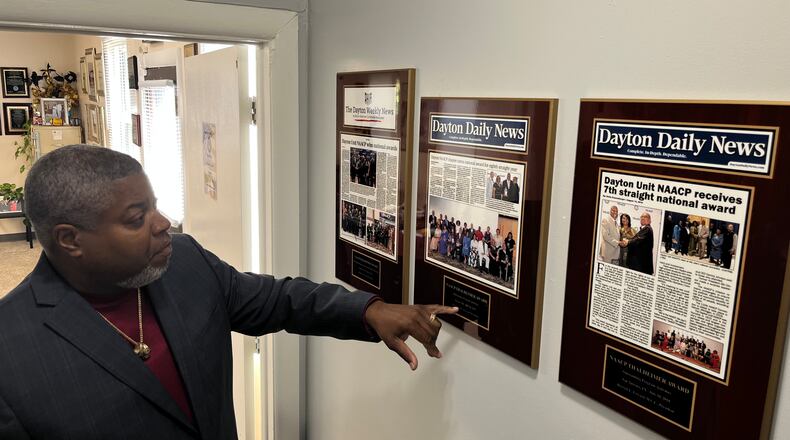The Dayton Unit NAACP held a grand opening event last month for its headquarters at 915 Salem Ave. They acquired the building in late 2020, but a combination of COVID protocols and renovation work delayed the official ceremony to this summer.
“To be able to have a place that we call home … we’re not paying rent, it’s our building. All those other offices in the past were places we rented, or someone allowed us to use their space,” Foward said. “This is the NAACP Dayton headquarters — where people can come for service, in terms of civil and human rights service and youth development.”
A building as a home
The NAACP had been on West Third Street for over three decades starting in 1984, near James H. McGee Blvd. in a building that housed the law offices of McGee himself.
Foward was quick to thank a huge number of partners, going all the way back to McGee and Lelia Francis before him who made sure the NAACP had space to work.
He said the recent move was only possible because of about two dozen partners, starting with the American Friends Service Committee, who previously owned the 915 Salem building, and including the local land bank, the Dayton Foundation and a host of contractors who did renovations, some at little to no cost.
Foward said the NAACP now has a lot more space than it had on West Third. He said the organization is glad to still be in the heart of West Dayton, having just moved from one main corridor to another.
“Since we’ve been here, we’ve done three turkey giveaways out of this building, this year we did an Easter ham giveaway … this structure here is embedded in the community, and it’s for the community,” Foward said.
Expanding on services
Foward said the NAACP continues to focus on a proactive civil rights agenda — implementing regular community education programs rather than waiting to react when problems happen.
In the lead-up to election season, that means multiple “candidate night” events organized by Second Vice President Tom Roberts, so residents can hear what the people running for city commission and school board believe.
It means bringing in Montgomery County Auditor Karl Keith for an event later this month on housing, revaluation and tax issues … and having regular presentations from the Dayton NAACP’s committees on health, the economy, veteran services and other subjects.
The NAACP has investigators who work to resolve the complaints that community members bring to the headquarters office, often on job discrimination, school and police issues. But Foward said the regular proactive outreach means the NAACP has been helping residents with 150-200 complaints per year, as opposed to the 300-400 that were common when he took over as president 17 years ago.
The NAACP is happy that its several youth groups involved in leadership and community service activities are now meeting at their headquarters building.
And Foward cited ongoing collaboration efforts by First Vice President Mattie White, saying the NAACP wants to work with as many groups as possible, focusing on the issues they agree on, even if there are other areas where they disagree.
To that end, he referenced a longstanding saying about nonpartisanship in politics.
“We have no permanent friends and no permanent enemies, only permanent interests … of what’s in the best interest of our constituents.”
About the Author




